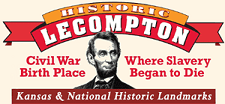 I’ve always been curious about the origin of the expression “Bleeding Kansas,” because I believe it is important that we trace the source of such historic phrases. Not only for historical accuracy, but also to preserve and protect their integrity. In the event the Lecompton Reenactors are ever asked to explain the origin of this phrase, following a performance of our plays “Bleeding Kansas” or “Kansas Territory,” the following information might be helpful. “Bleeding Kansas” is normally surrounded by quotation marks. So who was the author that either said it or wrote it? I believe it was our first territorial governor, Andrew H. Reeder. The governor on September 5, 1855 delivered his “bloody-issue resolutions” during a session of the free-state Big Springs Convention in Big Springs, Douglas County, Kansas. Reeder wrote or was recorded as saying the following:
I’ve always been curious about the origin of the expression “Bleeding Kansas,” because I believe it is important that we trace the source of such historic phrases. Not only for historical accuracy, but also to preserve and protect their integrity. In the event the Lecompton Reenactors are ever asked to explain the origin of this phrase, following a performance of our plays “Bleeding Kansas” or “Kansas Territory,” the following information might be helpful. “Bleeding Kansas” is normally surrounded by quotation marks. So who was the author that either said it or wrote it? I believe it was our first territorial governor, Andrew H. Reeder. The governor on September 5, 1855 delivered his “bloody-issue resolutions” during a session of the free-state Big Springs Convention in Big Springs, Douglas County, Kansas. Reeder wrote or was recorded as saying the following:
“Resolved, That we will endure and submit to these laws [the 1855 Kansas Statutes, aka the “Bogus Laws”] no longer than the best interests of the territory require, as the least of two evils, and will resist them to a bloody issue as soon as we ascertain that peaceable remedies shall fail and forcible resistance shall furnish any reasonable success&..” (This partial quotation, with bloody issue bolded by me, can be found on page 376 of the KSHS Transactions 1903-1904 Vol. VIII, 1904. Reeder’s blustering about resisting the “Bogus Laws” was short-lived. Once he was the target of arrest for treason by the territorial government, he tucked-tail for his home state of Pennsylvania, never to return to Kansas.)
There is an old manuscript document that can be found in the archives of the Kansas State Historical Society titled, “A Few References to the Origin and First Use of the Term “Bleeding Kansas.” It has these eight references about the term “Bleeding Kansas”:
1. The Home Library, R.S. Peale, 1883, gives the credit to Horace Greely [sp] publisher of the New York Tribune for its first usage. In the “Webb Scrap Book” we find a number of references, three of which give color to the belief that the expression came into use in 1856:
2. Davenport (Iowa) Gazette, July 17, 1856. Poem “Our Country’s Call. The first verse reads as follows: “Hear the Nation’s call, freemen, one and all, Hear Poor Kansas’ earnest cry: See her bleeding land lift its beckoning hand; Sons of freedom, come ye nigh.”
3. Ohio State Journal, Columbus, Aug. 9, 1856. A poem “Plea for Kansas. The first verse reads: “Listen! hear ye not the sighing, Of the Goddess, Freedom, dying, On the fields of Kansas lying, Weltering in her gore! Hear ye not her mournful pleading? See ye not her votaries bleeding? Lo! their souls from earth receding, Call for vengeance sore.
4. Springfield. (Mass.) Republican July 25, 1856. Poem “Freedom’s Summons. First verse: “Over Kansas’ lovely plains, Widely desolation reigns; Dark her soil with many stains, Stains from freeman’s blood! He who scorns to own a slave, Finds, full soon a bloody grave; Death and ruin meet the brave, Scorn and hate, the good.”
5. Wilder’s Annals of Kansas, page 138: 1856, “Far in the West rolls thunder, The tumult of battle is raging, Where bleeding Kansas is waging, Warfare with Slavery!
Struggling with the foes who surround her, Lo! she implores you to stay her! Will you to slavery betray her? Hurrah! Swear that you’ll never betray her; Kansas shall yet be free!” (This notation was dated as September 13, Wilder states that “Chas. S. Weyman receives the prize for a Republican campaign song. The tune is “Suoni la Tromba.” This is its spirit.”)
6. Wilder’s Annals, 1856, page 140: “Fair Kansas, bleeding at thy feet, A trophy lies; And murdered men and widowed wives, And gory looks and scalping knives, In heaps arise.” (From D.W. Wilder’s Annals of Kansas: 1541-1885, dated October 10, 1856 and notated as “A woman of New York ” writes an address to President Pierce:)
7. Gov. Walker’s Inaugural address at Lecompton, May 27, 1857 contains quotation of the phrase “Does she want to be “bleeding Kansas” for the benefit of political agitation within or without her limits” etc. [See Historical Collections, Vol. 5, p.339.]
8. C.D. Brewerton in “War in Kansas” published in 1856, page 395 says: “When Kansas bleeds, Georgia must open her veins and Massachusetts, too.” (Brewerton’s initials were G. D. not C.D.; and his book was titled, The War in Kansas. A Rough Trip to the Border, Among New Homes and A Strange People.
